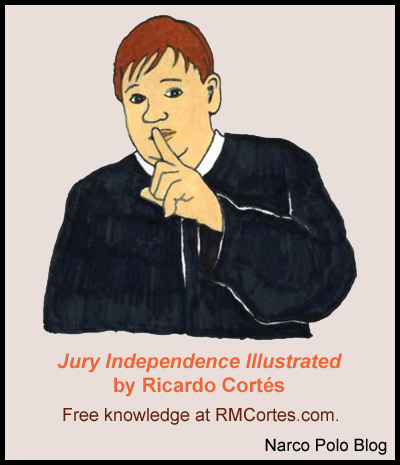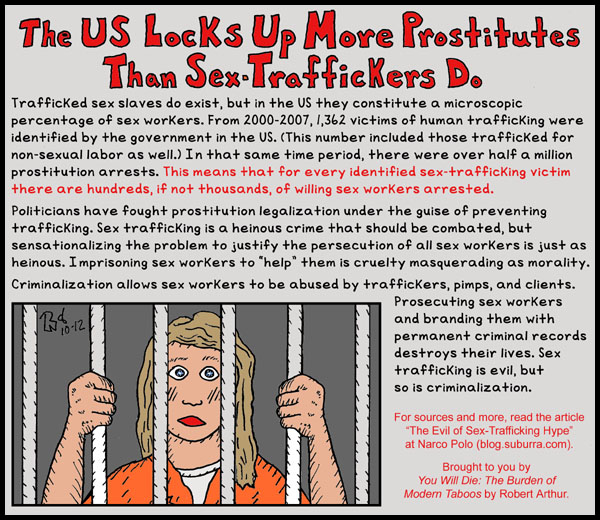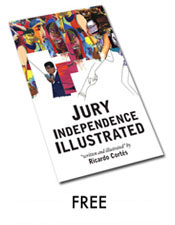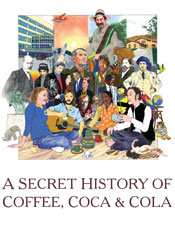Posted: June 13th, 2013 | Filed under: civil liberties, cocaine, drugs, history, marijuana, prostitution | 2 Comments »

An American juror has the power to deem a defendant “not guilty” in a criminal trial even when the evidence of guilt is overwhelming. The juror can, in effect, nullify a law believed to be either unjust or unjustly applied. This legal doctrine is known as jury nullification. Drug-war opponents and sex-work activists should familiarize themselves with this aspect of jurisprudence, and thanks to Ricardo Cortés jury nullification is now colorfully accessible.
Cortés is the illustrator of the New York Times bestselling children’s book, Go the F*ck to Sleep (2011).* He also wrote and illustrated the children’s book about marijuana, It’s Just a Plant (2005), and A Secret History of Coffee, Coca & Cola (2012). His illustrated book on jury nullification is called Jury Independence Illustrated (2011) and the ebook can be viewed for free here.
Jury nullification has a rich history dating back to before the Revolutionary War. In colonial times it was used to free people prosecuted for criticizing the government. During the 19th century, juries as far south as Georgia would refuse to convict people who aided escaped slaves. During the 20th century, juries used it to free alcohol criminals under prohibition, artists charged under obscenity laws, and homosexuals charged under sodomy laws. (Critics point out that racist juries have also used jury nullification to free persecutors of minorities. A recent case where this may have occurred is here.)
Although jury nullification is explicitly authorized in three state constitutions, many jurisdictions bar judges and lawyers from telling jurors about it. California has gone so far as to rule that a juror who openly argues for jury nullification can be discharged. In contrast, the “Live Free or Die” state of New Hampshire made it a state law in 2012 that judges must allow defense attorneys to inform jurors of their authority to nullify. (Read more about California’s ruling here, and New Hampshire’s law here.) Due to jurisdictions like California, the Fully Informed Jury Association (FIJA) advises:
We caution jurors NOT to lobby their fellow jurors obviously toward nullification during deliberations! It has been established in court precedent that judges may remove jurors, even during deliberations, if the judge becomes aware that they are considering jury nullification in coming to a verdict. If a single fully informed juror is removed from the jury because he or she made his or her intentions known by attempting to lobby other jurors, the defendant may be left without anyone in his or her corner during deliberations. It is much better for the defendant if that fully informed juror simply hangs the jury. A hung jury is always better than a conviction, and the prosecutor will have to think twice about whether or not it is even worth it to retry the case. (2)
Prominent advocates of jury nullification for drug cases include the writers of HBO’s Baltimore drama The Wire, San Diego Mayor Bob Filner, and the George Washington Law School professor Paul Butler. Their statements can be read here, here, and here respectively.
For more detailed information on how to ethically get seated on a jury in order to nullify the prosecutions of non-violent drug criminals read “A Guide to Surviving as a Juror” by the Texas attorney, Clay Conrad. Conrad is the author of Jury Nullification: The Evolution of a Doctrine (1999).

* Samuel L. Jackson’s reading of the book went viral in 2011. It can be seen here.
Sources
1. Clay Conrad, “A Guide to Surviving as a Juror,” CounterPunch.com, 5 Feb. 2003. LINK
2. “Reminder: Juries Can Nullify Marijuana Charges If They Find Them Unjust,” FIJA.org, 1 Apr. 2013. LINK
Posted: May 23rd, 2013 | Filed under: civil liberties, media bias | 2 Comments »

*** Outside of the sources, text below is same as in cartoon. ***
In 2013 elite American media outlets are in a fury about the Obama DOJ’s criminal investigation of James Rosen of Fox News under the Espionage Act of 1917. (3)
In contrast, the criminal pursuit of Julian Assange of WikiLeaks for the same “crime” led much of the US journalistic community to shun him. (4, 3)
In 2010 the NY Times Executive Editor said that Assange was not a “kindred spirit” and that his prosecution would not necessarily be an attack on press freedom. (1)
The Espionage Act of 1917 was first used against non-government-employees who had received and disseminated classified information by the W. Bush DOJ. (2)
Sources
1. Jeff Bercovici, “NY Times Editor: WikiLeaks Is ‘Not My Kind of News Organization,'” Forbes.com, 16 Dec. 2010. LINK
2. Glenn Greenwald, “Attempts to Prosecute WikiLeaks Endanger Press Freedoms,” Salon.com, 14 Dec. 2010. LINK
3. Rebecca Shapiro and Jack Mirkinson, “Obama Administration’s Media Surveillance Unleashes Wave of Condemnation,” HuffingtonPost.com, 22 May 2013. LINK
4. Nancy Youssef, “In WikiLeaks Fight, US Journalists Take a Pass,” McClatchyDC.com, 9 Jan. 2011. LINK
Posted: October 30th, 2012 | Filed under: civil liberties, prostitution | 7 Comments »

In America, our government locks up exponentially more prostitutes than sex traffickers do. Trafficked sex slaves do exist, but in the United States they constitute a microscopic percentage of sex workers. From 2000–2007, 1,362 victims of human trafficking were identified by the federal government in the United States. (4) (This number included those trafficked for non-sexual labor as well.*) In that same time period, there were over half a million prostitution arrests. (3) This means that in America for every identified sex-trafficking victim there are hundreds, if not thousands, of willing sex workers arrested by law enforcement.
Bolstered by anti-sex feminists and fundamentalist Christians, American politicians have fought the legalization of prostitution under the guise of preventing sex trafficking. The assertion that legalizing sex work promotes sex trafficking is counter-intuitive and there is “absolutely no evidence” to support it.** (8)
The false nexus between legalization and trafficking was exposed by the British. In the United Kingdom, where prostitution is legal, sensationalism about the trafficking of sex slaves led to a massive crackdown using every police force in the country. In 2007 and 2008, 822 brothels, flats, and massage parlors were raided. They did not find a single person who had forced anybody into prostitution. (2)
Sex trafficking is a heinous crime that should be combated, but sensationalizing the problem in order to persecute all sex workers is just as heinous. Imprisoning sex workers to “help” them is cruelty masquerading as morality.
Driving prostitution underground imperils the safety of all sex workers. Criminalization is what allows them to be abused by traffickers, clients, pimps, and the police. (7) Prosecuting sex workers and branding them with permanent criminal records destroys their lives. Sex trafficking is evil, but so is criminalization.
(For more Narco Polo postings and cartoons on sex work go here.)
* It is likely that sexual slavery accounted for only a small minority of this number. In a 2005 Nation article, Suzanne Tomatore, an attorney who heads the Immigrant Women and Children Project of the Association of the Bar of the City of New York was quoted as saying that the “vast majority” of her clients were trafficked into domestic work. (6)
** Studies of the “Swedish model” that make this claim have been thoroughly discredited. See Maggie McNeill’s synopsis of an Australian governmental analysis or Dr. Laura Agustín’s writings on the topic. (5, 1)
Meet Some Sex Workers
To hear the voices of some proud, intelligent, and fabulous sex workers check out the blogs The Honest Courtesan and Bound, Not Gagged. An entertaining and witty Twitter feed of an active sex worker is Nun Ya’s @Ishfery.
This post is dedicated to the sex-worker rights activist, Robyn Few, who passed away last month. She patiently answered my queries years ago. You can learn more about her life here and read a New York Times article on her activism here.

Sources
1. Laura Agustín, “Trying to Prove Swedish Law Reduces Trafficking: Garbage In, Garbage Out,” theLocal.se, 16 Aug. 2010. LINK
2. Nick Davies, “Inquiry Fails to Find Single Trafficker Who Forced Anybody Into Prostitution,” Guardian, 19 Oct. 2009. LINK
3. There were 653,500 prostitution related arrests from 2000–2007. “Easy Access to FBI Arrest Statistics 1994–2008,” OJJDP.gov, 2011, ret. 7 Apr. 2012.
4. Jerry Markon, “Human Trafficking Evokes Outrage, Little Evidence,” WashingtonPost.com, 23 Sep. 2007. LINK
5. Maggie McNeill, “Down Under,” The Honest Courtesan (blog), 9 June 2011. LINK
6. Debbie Nathan, “Oversexed,” TheNation.com, 2005 Aug. 29, p. 3. LINK
7. An Illinois study found that police accounted for 30% of all reported abuse, compared to 4% arising from pimps. Noy Thrupkaew, “A Misguided Moral Crusade,” NYTimes.com, 22 Sep. 2012. LINK
8. Ronald Weitzer, “Moral Crusade Against Prostitution,” Society, Mar./Apr. 2006, p. 37.












